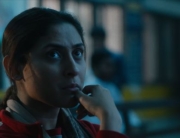
I’m glad to have watched Uncle Frank with no preconceived notions, since a casual glance at its Rotten Tomatoes page will reveal that it is receiving a mixed response. A review from IndieWire refers to it as “thin gruel,” another from RogerEbert.com cites frustrations with a “shallow script,” and The Hollywood Reporter describes it as a “shabbily constructed” film that is “thirsty for audience love.”
I won’t argue that this film is either perfect or profoundly original. However, I will say that knowing nothing beforehand, I found its strengths are significant enough to render its flaws less remarkable. Writer/director Alan Ball takes a big risk with an open appeal to the heart, and while he sometimes caves to sentimentality, and viewers can’t pretend that every event is infallibly plausible, he succeeds in creating a moving portrait of a family and two people in particular: Elizabeth Bledsoe (Sophia Lillis) and her Uncle Frank (Paul Bettany).
The year is 1969, and they are the two oddballs in their large, lively South Carolina family: Betty (as her parents call her), because she is intellectual and thirsty for experience beyond what she has known; and Frank, for reasons that are not immediately clear to her or us. He’s a literature professor at New York University, he rarely comes home, and he is kind to everyone and especially to Betty. He looks her in the eye, gives her Madame Bovary to read, and encourages her to become the person she wants to be, as opposed to the person others have decided for her. Yet he’s also an object of spite for Daddy Mac (Stephen Root), the family patriarch, and spends much of his time at family gatherings alone.
At Uncle Frank’s encouragement, Elizabeth enrolls at NYU, begins calling herself Beth instead of Betty, and quickly learns more about Frank than she expected to. At a party she’s not supposed to attend, she discovers he’s gay and has lived with his partner, Wally (Peter Macdissi), an immigrant from Saudi Arabia, for 10 years. (Where Frank is restrained and quiet, Wally is eager and effusive.) After Daddy Mac dies abruptly of a heart attack, Beth and Frank head back home, and the film quickly becomes more about Frank’s reckoning with his past than Beth’s coming of age, though she doesn’t recede completely into the background.
Lillis and Bettany deliver two beautiful performances. Lillis is subtle in her diction and body language, full of youthful energy, and thoroughly believable as a young woman encountering, and processing, the complexities of adult life. Bettany, in what might be his best performance, is elegantly restrained and captures a complex set of warring emotions so well that, even if an overwrought flashback sequence threatens to undermine our belief in his story, his portrayal of Frank and his struggle with trauma never loses its power.
This film is at its strongest when it portrays those who are forced to encounter something new, especially in each other, whether it is a niece encountering new aspects of her uncle or Wally finally getting to meet his lover’s family. There is a certain giddiness that presides over the film as a result of the emotions these encounters release. Viewers might disagree, but I found the characters mostly absent of cliché, all flawed human beings, and far from one-note.
It may be that the end is unrealistically warm, though viewers may notice that this warmth is, in some ways, compromised. Still, there is an argument to be made that the acceptance of difference one sees here is anachronistic or demands more space to make it convincing, and one has the sense that sections of the story are somewhat breezed over. Yet this didn’t matter so much. There is no real pattern to determine what makes us decry the flaws of some films and forgive the flaws of others. Uncle Frank, anchored by at least two masterful performances, is a film I’m glad to have seen.






Leave A Comment